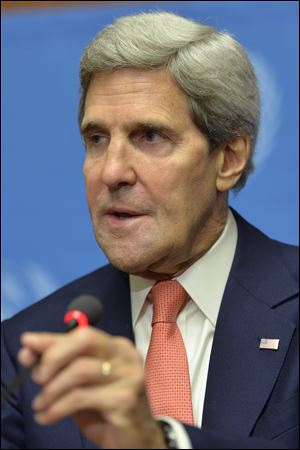
EDITORIAL
Keep talking
9/23/2013
Kerry
Despite the international focus on chemical weapons and the civil war in Syria, the main event in the Middle East remains the continuing Israeli-Palestinian talks, which seek to resolve that fundamental 65-year-old conflict.
The latest talks began July 30 in Washington, because of the determination of Secretary of State John Kerry. He made the re-establishment of these talks, which had fizzled in late 2009 after President Obama launched them, his top priority. To that end, he traveled to the region six times, meeting with Israeli Prime Minister Benjamin Netanyahu and Palestinian Authority President Mahmoud Abbas.
It’s hard to say how the talks are going. The parties in Israel and the Palestinian West Bank have been tight-lipped. The two sides have been operating on the basis that prospects for success are improved by an absence of public and media discussion.
Mr. Kerry presumably is following the discussions closely, despite the events in Syria. He met with Mr. Netanyahu on Sept. 15, no doubt to confirm that the Israelis still are committed to the negotiations.
The Israelis, in general, had something of a setback as the United States chose to work with the Russians to avoid a showdown in Congress on attacking Syria.
The Israelis were in the process of lobbying heavily in Washington through the American Israel Public Affairs Committee for congressional authorization of a U.S. attack on Syria.
The Syrian government has pledged to sign the United Nations Convention on Chemical Weapons, leaving hanging the awkward fact that, in the Middle East, Israel has yet to ratify it and Egypt hasn’t signed it.
These are, however, only bumps in the road toward peace between Israelis and Palestinians, which still is the most important issue in the region, with implications for better relations between the West and the Muslim world in the long run. These talks must continue and succeed.